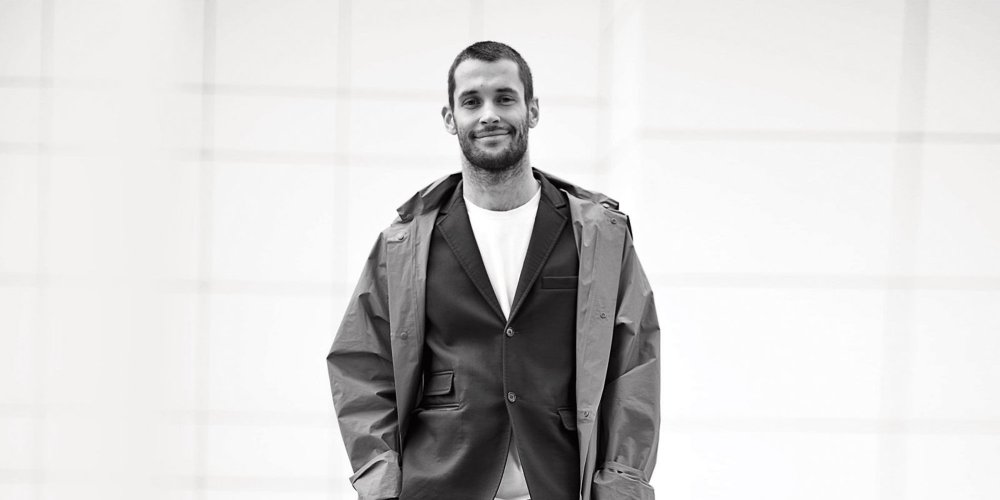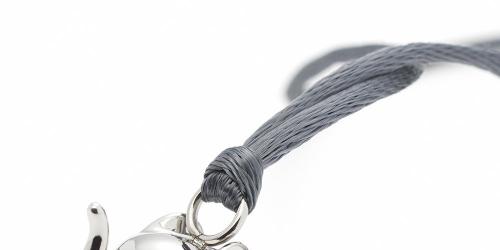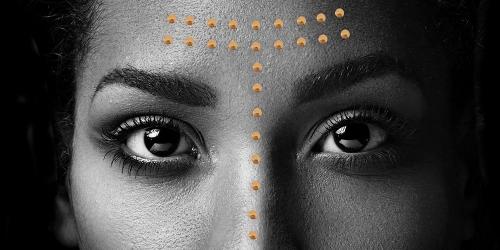This March morning, Simon Porte Jacquemus has a broad smile and a bright pink shirt. As a figure of the revival of Parisian creation, his sense of narrative garment made his parades unavoidable. Arrived from the Lubéron at 18 years, without any contact but with the will of those who achieve their ends, it challenges fashion editors by e-mail, organizes happenings in the street. Then a salesman at Comme des Garçons the day, he creates the night. In 2015, he was awarded the LVMH Prize Special Jury Prize. At 27, this self-taught artist today seduces Rihanna and multiplies the best-sellers - inhabited rooms, colorful, daring proportions.
Notably, he often posts pictures of his mother on Instagram. Sober words indicate that she is no more. It is to her that he dedicates his collections. We wanted to hear her tell the one who nourishes her imagination, her vision, and which he sometimes speaks in the present. "The terrible of the dead is their gestures of life in our memory. Because then, they live atrociously and we do not understand anything anymore, " writes Albert Cohen in The book of my mother . "That's exactly it," says Jacquemus.
MC: Your mark, Jacquemus, is your mother's maiden name. Does that require you to honor that name?
Simon Porte Jacquemus: I was born Simon Porte. But when I lost my mother, I wanted to become Simon Porte Jacquemus. I added it to my ID card. What is beautiful is that my father is a Jacquemus too. My parents are distant cousins, they have a grandmother in common. I do not see this name as a cause to be defended either, but there is a sincerity, it is the name of my mother, not a concept.
What did she see first?
His smile. She always told me it was the most beautiful weapon of life. When I got bothered at school, she said, "Simon, mouse. "Then she smiled at a passerby on the street for example. She had a woman-child side. A mischievous, joyful thing. She was different from other mothers. It made me feel uncomfortable at times. I saw her come to school, in pink candy from head to toe, pink down jacket, pink pants, Converse roses. She was very free. Everybody knew her in Bramejean, our hamlet. When she married my father, they were the most beautiful couple in the neighborhood, Valerie and Vincent. It is romantic to say so. I like this idea.
Was she a woman who loved to stand out?
Yes. We are a peasant, a family of farmers, but I think we always wanted to be singular. There has always been an artistic sensibility in our country. My father was music, my mother, the decoration. From walls to furniture, she did everything herself. I felt like I was living in a magazine, but not much money. She used bed springs to make enormous candle holders, made a sheet composition in 3D in a frame. It was the 90s, she was ahead of style recovery. Every six months, you had to repaint everything from A to Z, change everything. She gave me that virus. She went out shopping and when I got back I had moved all the furniture. To surprise her, create novelty.
She loved dressing too. A suede bustier with jeans, big man's shirts. The taste of white comes to me from her especially. In summer, she wore these white cotton nightgowns of the 20s, with big lace. A little like the last Santons de Provence dress (spring-summer collection 2017, ed.). When she saw it, my grandmother said, "Oh! That's your mother. "
It is therefore found in your visual grammar: necklines, rounds, white shirts, man's jackets, frank colors ...
Yes, it is found in a sort of poetry of the garment. Taking a simple trick to make it something special. Tie a scarf to an unexpected place, a stack.
How did she dress you?
She let go, I spent my childhood with looks. All in white, or with big daisies on the pants. The little all yellow in the class picture, it was me. I was much remarked, child. In my village, we knew that everyone was expecting something from Simon. The postman, the neighbors, everybody. We did not know what I was going to do, if I were going to be a singer, a dancer ... I was already claiming so much. And then I was on TV. I had advertised 106 Peugeot - "But no, but no, tutu tutu. "At 3 years old, my mother enrolled me in a modeling agency, I loved it.
You were very close. She was your confidante?
No, it's my grandmother who has always been my confidante. My mother was more like a friend. With that we ate Michoko at 10pm in front of the TV in my room. She liked to make bullshit to make me laugh. I had a very special relationship with my mother because I slept a lot with her. Too much. I was always glued to her. Feet against feet to fall asleep. My father had no place in the bed. It was not a report where she was asking me how it had happened, no. Something more fusional.
She had indulgence for your whims?
All the children of my family are little kings. Spoiled children. I was never told no. A teenager sometimes needs it. One day I said to him, "Why do not you tell me no? My notes do not interest you? "She said," You know Simon, I trust you, I think it's your life, and it is for you that you have to work, not to make me happy. "It shocked me, I was smart to say that, but in that time I wanted to have the perfect mom, the parents-teachers meetings, she hated the way. She said, "Never will I look like that, always ask questions for a notebook, I do not care. "
What did you admire in her?
His madness I think. At my birthday parties, she disguised all the children as a woman, putting on make-up everywhere, dancing on the couch with us. I see her completely crazy to jump everywhere, put the music to the bottom. I am often told that I do a lot of spelling mistakes, but at home we did not do homework, Marie Laforêt was thoroughly drunk and danced. It's a pretty madness.
You said that making collections was a way to keep talking with your mother ...
Talking about her anyway, that's for sure. My collections are my biographies. When I lost my mother, I had just arrived in Paris, it was a month since I was there. I am 18 years old. I was told that my mother had an accident and she needed me. Arrived at the airport, all my family was waiting for me, I understood. I did not find my mother on a hospital bed but on a deathbed. It was violent. So I did what I did all my childhood, I slept next to her. I touched his skin, I felt it. And I think it changed my life. It gave me a crazy energy. A few days after the funeral I decided to go back to Paris. It surprised my family. I said, "If I do not leave now, I will never leave. "And I went back to Paris with rabies. A positive rage. I could have dismantled the Eiffel Tower. I was like myself. I felt like I was not alone, that she was there. That's what gave me the strength to start something. She had a stupid car accident, very stupid. Someone got into it, she was 42 or 43, I never know. Everything can stop tomorrow, so I said to myself, "You're ready, Simon, throw your mark, it's your mother's name, do it," and I did.
This vital momentum you felt was the result of the education she gave you ...
She always told me I was the best. At 8 years old, I pulled out a curtain in beige linen, very beautiful, I cut it with scissors, I drilled holes, made a sort of lacing with the green laces of faux Converse, and I I made a skirt. She wore it, I see it walking with out. And she told me I was the best, that I could do everything. The skirt was far from perfect, but she thought it was beautiful. I saw the pride in his eyes. I would not be there without losing it. It's a nice gift somewhere, even if it's a bit poisonous.
Creating clothes is a way of telling stories of women?
I saw it as the love of women. The desire to make clothes came because I was obsessed with seeing women on TV, fascinated by all these different characters. I often quote Charlotte Gainsbourg in L'effrontée , but it could be Laure, a woman doctor, in Sous le soleil . Even today, I get lost on Youtube in front of interviews of the 90s, I like to see women talking. Emmanuelle Béart at Thierry Ardisson, Emmanuelle Seigner uncomfortable on a set, Isabelle Adjani at the handing over of the Caesars. Their moments of shyness and fragility affect me. Maybe I'm trying to find my mother in them now.
Article originally published in MC n ° 788, dated June


